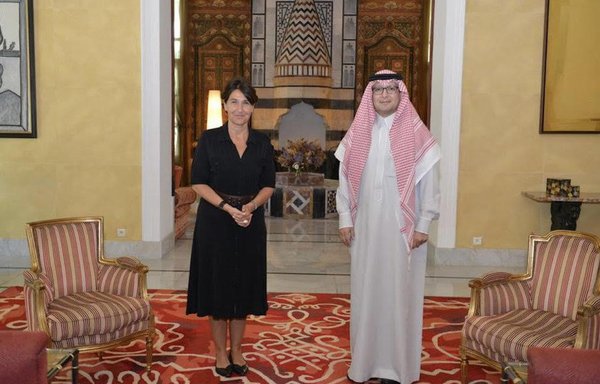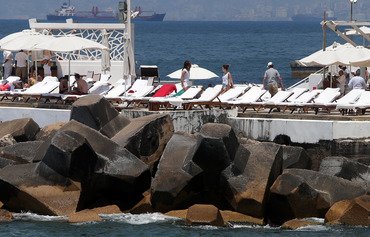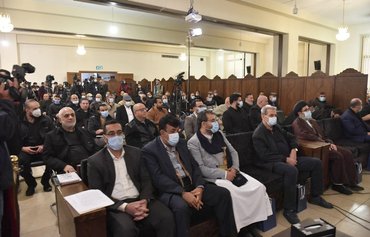BEIRUT -- The Gulf states have demonstrated their continuing commitment to Lebanon's welfare and stability, despite recent friction, by returning their ambassadors to the crisis-hit country and launching a fund to help its people.
Saudi Arabia and France on Tuesday (April 26) announced the launch of a joint fund to provide the Lebanese people with direct humanitarian assistance.
The two countries had in December pledged to provide emergency financial support and implement humanitarian projects to support the Lebanese people, with an initial €36 million ($38 million) contribution.
"The fund will be dedicated to humanitarian, health, educational and electricity projects, and also will include some security projects," Saudi ambassador to Lebanon Walid Bukhari said.

Saudi ambassador to Lebanon Walid Bukhari is seen here with French ambassador to Lebanon Anne Grillo in a photo he posted on Twitter April 14, after the two discussed a mechanism for implementing a partnership to support Lebanon.
A Saudi-French committee will be formed to oversee the distribution of assistance directly to individuals and entities, he said, ahead of the launch.
Earlier this month, Bukhari and Kuwaiti ambassador Abdel Aal al-Qenai, who had been withdrawn in October, returned to Lebanon.
Yemen also said it was returning its envoy to Beirut.
Restoration of ties
The return of Gulf ambassadors to Lebanon "re-opens the horizon for communications between officials" and "restores ties with our Gulf brothers", former justice minister Ashraf Rifi told Al-Mashareq.
The move is popular in Lebanon, he said, as "it wasn't acceptable that Gulf ties be severed by a political class controlled by Iran via Hizbullah, while a large segment of the Lebanese people reject such a hand".
"As officials, we look forward to an Arab project to counter the Iranian agenda, to strike a balance and curb Hizbullah's hegemony over Lebanon," he said.
The return of Gulf ambassadors, coupled with the new Saudi-French fund, "will have a good effect on the daily lives of the Lebanese people in terms of medicines, medical treatment, education and food", Rifi said.
"The assistance to be provided by the fund will not go through official channels, which aren't trustworthy," he said, commending the French and Saudi authorities on that step.
"Otherwise, the Lebanese people would not get the assistance they need to alleviate the severity of the crises they face," he added.
Political analyst Roula Mwaffaq said the withdrawal of Gulf ambassadors from Lebanon "had sent a strong, shocking and painful message to the Lebanese... about the extent of silence over and surrender to the status quo".
"The Gulf has returned to Lebanon with a humanitarian dimension to support the people in various fields and help them deal with crises until the region is put in order and parliamentary and presidential elections are held," she said.
"The humanitarian assistance is directed towards the people to help them overcome their living and financial crises until the state plays its role, introduces real reforms and stops the smuggling of drugs to the Gulf," she added.
Restoration of balance
Diplomatic ties with the Gulf have been restored in response to "calls from friends of Saudi Arabia and the Gulf in Lebanon", said Charles Jabbour, spokesman for the Lebanese Forces political party.
While many in Lebanon wish to maintain good relations with the Gulf, he said, the authority that controls the political decision-making process has "offended all Gulf states and the Lebanese people by becoming a tool in Hizbullah's hands".
Now, he added, "the prime minister himself promised that Lebanon wouldn't be used as a platform to target the Gulf states on security, military, political or media fronts".
It is clear the Gulf states regard Lebanon "as an integral part of the Arab world and the Arab League", he said, and are keen to prevent "any attempt to turn it into an Iranian province subject to Tehran's regional policies".
The return of Gulf ambassadors is very important in establishing and consolidating a balance to prevent Iran from controlling Lebanon and turning it into a tool in its hands, he said.
The timing of this move, ahead of the parliamentary elections slated for May 15, has given the Lebanese hope that their country will not be left to "face its fate alone".

![Saudi ambassador to Lebanon Walid Bukhari briefs Lebanese President Michel Aoun on preparations to launch a joint French-Saudi humanitarian fund for the Lebanese people. [Twitter]](/cnmi_am/images/2022/04/28/35092-saudi-ambassador-aoun-600_384.jpg)





